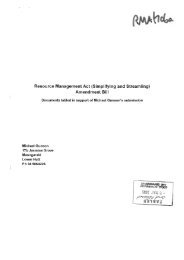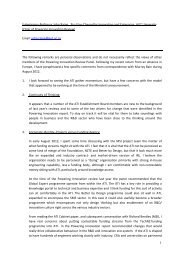Parliamentary Debates (Hansard) - New Zealand Parliament
Parliamentary Debates (Hansard) - New Zealand Parliament
Parliamentary Debates (Hansard) - New Zealand Parliament
Create successful ePaper yourself
Turn your PDF publications into a flip-book with our unique Google optimized e-Paper software.
3636 Local Government (Auckland Reorganisation) Bill 16 May 2009<br />
Hon TREVOR MALLARD: The other point I make is to ask you to elucidate on<br />
your ruling on one particular point that was not clear. You indicated that it would make<br />
a difference whether the parts had been on notice or not on notice. I could not tell from<br />
your comments whether something that had been on notice would have a longer debate;<br />
whether because something had not been on notice members needed time to look at it,<br />
and it would therefore have a longer debate; or whether something not on notice would<br />
have a shorter debate because there had been no notice. Could you indicate which of<br />
those you meant?<br />
Hon SIMON POWER (Deputy Leader of the House): I appreciate the member’s<br />
wanting some elucidation on some of the finer detail around some of these judgments,<br />
and the shadow Leader of the House’s views on these matters. It has always been my<br />
understanding that when a closure motion is taken by the Chair is a matter for the sole<br />
discretion of the Chair. It has been my experience over the last short while that<br />
whenever an attempt is made to try to define those parameters, the fall-back position is<br />
the Standing Order in that regard.<br />
The CHAIRPERSON (Hon Rick Barker): The member is absolutely correct. It has<br />
always been, and will always be, the sole discretion of the Chair whether a closure<br />
motion is taken, and the Chair will take it as he or she sees fit. I do not want to get into a<br />
long debate about the matter the Hon Trevor Mallard raised. Although members put up<br />
amendments and call them parts, that is only the way they themselves have described<br />
them. Those proposed new parts could in another way be looked at in substance, in<br />
effect, as amendments.<br />
Hon Annette King: You can’t make that decision.<br />
The CHAIRPERSON (Hon Rick Barker): I can make that decision about<br />
substance. For example, members get up and quite often say: “I am raising a fresh point<br />
of order.” when, in fact, they are not. They say that simply to relitigate the same matter;<br />
they describe it as a fresh point of order when it is not. I think everybody has been<br />
guilty of that at some stage.<br />
Hon Trevor Mallard: Can you elaborate on the notice thing, Mr Chair.<br />
The CHAIRPERSON (Hon Rick Barker): On the notice thing, the bill was put on<br />
the Table, and members have had a long time to read it, in terms of hours. But these<br />
proposed new parts have turned up—they have just appeared. The point I make is that I<br />
consider the bill, as tabled by the Government of the day, as being the issue we are here<br />
to debate. That is the main focus of this debate. When members table amendments to<br />
the bill, they are of lesser concern, to a degree, than the actual bill. When members table<br />
amendments that they put up as new parts, they may describe them as parts, but when<br />
one reads them one could describe them as amendments because they are not as<br />
significant as what we would normally have as a part of a bill. We will be flexible about<br />
this matter.<br />
I say to members that regardless of all that is going on around the edges, it will<br />
remain the sole discretion of the Chair how long the debate goes on for. There will be<br />
no correspondence entered into. The Committee will determine closure motions by vote,<br />
and the content of the speeches will be the Chair’s consideration. If speeches are on<br />
target, and are discussing and elucidating the amendments we are considering, then the<br />
debate will tend to go on for longer. If people get off task and we are on to everything<br />
else but the part or amendment we are discussing, then the Chair will consider closure<br />
motions much more quickly. Members should be assured of that.<br />
Hon TREVOR MALLARD (Labour—Hutt South): I raise a point of order, Mr<br />
Chairperson. I thank you for your ruling; it was very helpful. I would like to extend an<br />
invitation to you to make an examination of Part 2 of the bill and of the proposed<br />
amendments. When you are considering your tariff in relation to substance, I think you






![Full evidence text [PDF 8908k] - New Zealand Parliament](https://img.yumpu.com/14025494/1/184x260/full-evidence-text-pdf-8908k-new-zealand-parliament.jpg?quality=85)
![−3 JUN 2009 IRELEASED] - New Zealand Parliament](https://img.yumpu.com/12829724/1/185x260/3-jun-2009-ireleased-new-zealand-parliament.jpg?quality=85)
![Full paper text [PDF 3515k] - New Zealand Parliament](https://img.yumpu.com/11267192/1/184x260/full-paper-text-pdf-3515k-new-zealand-parliament.jpg?quality=85)


![Full evidence text [PDF 9k] - Parliament](https://img.yumpu.com/7938085/1/184x260/full-evidence-text-pdf-9k-parliament.jpg?quality=85)





